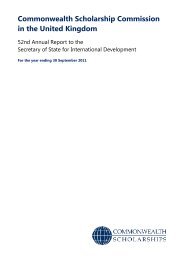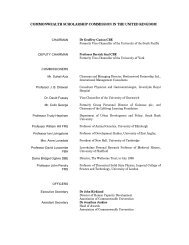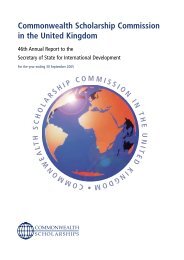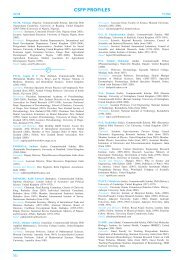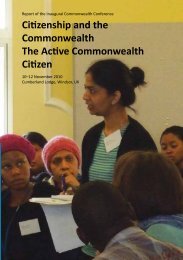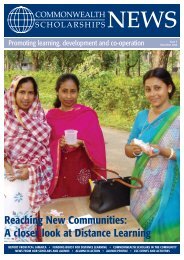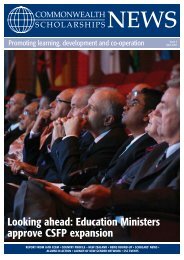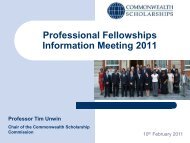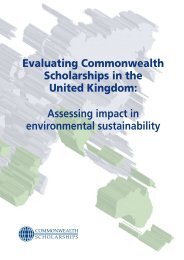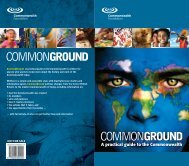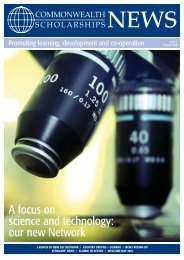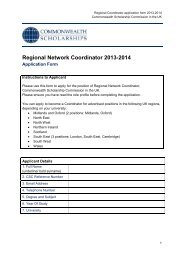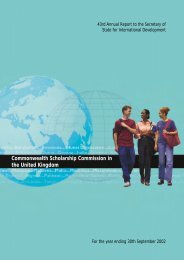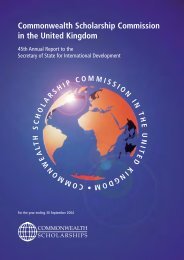Issue 13 - Commonwealth Scholarship Commission in the United ...
Issue 13 - Commonwealth Scholarship Commission in the United ...
Issue 13 - Commonwealth Scholarship Commission in the United ...
You also want an ePaper? Increase the reach of your titles
YUMPU automatically turns print PDFs into web optimized ePapers that Google loves.
My PhD topic is <strong>in</strong>fluenced by my experiences as as<strong>in</strong>gle mo<strong>the</strong>r and as a professional woman.Even though it has been difficult, I have made it this far with <strong>the</strong>support of colleagues, friends and neighbours.Friends and family: <strong>Commonwealth</strong> Scholar Lucille Maqubela (back row, second from left) with sons Tlotlego (back row, left) and Keena (back row, second fromright), and <strong>Commonwealth</strong> Scholar Monica Kirya (back row, right), with son Immanuel (front row, right) and daughter Asifiwe (front row, left)<strong>in</strong>effective nor a def<strong>in</strong>ite success, but somewhere <strong>in</strong>between. Factors such as contradictions and doublestandards <strong>in</strong> <strong>the</strong> policies of <strong>in</strong>ternational donors,which result <strong>in</strong> <strong>the</strong> weak enforcement of aidconditionalities, as well as <strong>the</strong> nature of politics andgovernment <strong>in</strong> Uganda – described as “neopatrimonial”<strong>in</strong> character because it is based onpersonal ties as opposed to <strong>the</strong> rule of law andproper adm<strong>in</strong>istrative procedures – may h<strong>in</strong>der <strong>the</strong>effectiveness of <strong>the</strong>se commissions.‘On <strong>the</strong> o<strong>the</strong>r hand, my study shows that, despite <strong>the</strong>exist<strong>in</strong>g shortcom<strong>in</strong>gs, commissions of <strong>in</strong>quiry havemade a positive contribution to <strong>the</strong> search fortransparency and accountability <strong>in</strong> Uganda by nam<strong>in</strong>gand sham<strong>in</strong>g <strong>the</strong> corrupt and, even more importantly,promot<strong>in</strong>g public knowledge and debate on <strong>the</strong>nature, causes and effects of corruption. Thus,commissions of <strong>in</strong>quiry may be regarded as mak<strong>in</strong>g asignificant contribution to sow<strong>in</strong>g <strong>the</strong> seeds for ananti-corruption norm <strong>in</strong> Uganda.‘I hope that my study will br<strong>in</strong>g a positive angle to<strong>the</strong> debate on corruption <strong>in</strong> develop<strong>in</strong>g countries,which tends to be overwhelm<strong>in</strong>gly pessimistic,and that it will <strong>in</strong>form future research gearedtowards f<strong>in</strong>d<strong>in</strong>g solutions to this pervasiveproblem. If <strong>in</strong>deed my PhD can make a modestcontribution <strong>in</strong> this regard, <strong>the</strong> personaldifficulties I have faced <strong>in</strong> do<strong>in</strong>g it will have beenmore than worth it!’February 2011 7
WOMEN AS AGENTSOF CHANGEThe <strong>the</strong>me of <strong>Commonwealth</strong> Day 2011 will sh<strong>in</strong>e a spotlight on gender equality <strong>in</strong> <strong>the</strong><strong>Commonwealth</strong>. Nyssa Lee-Woolf looks at current <strong>in</strong>itiatives and plans for <strong>the</strong> future.‘Study after study has shown us that <strong>the</strong>re is no toolfor development more effective than <strong>the</strong>empowerment of women’. These were <strong>the</strong>n UNSecretary-General Kofi Annan’s words to <strong>the</strong><strong>Commission</strong> on <strong>the</strong> Status of Women <strong>in</strong> 2005. Everyyear, 26,000 women are born <strong>in</strong> <strong>the</strong><strong>Commonwealth</strong>. It is fitt<strong>in</strong>g, <strong>the</strong>refore, that this year<strong>the</strong> <strong>Commonwealth</strong> will celebrate this group ofpeople, described by <strong>Commonwealth</strong> Secretary-General Kamalesh Sharma as ‘mak<strong>in</strong>g up over halfof <strong>the</strong> world’s population, receiv<strong>in</strong>g less than half <strong>the</strong>attention and deal<strong>in</strong>g with more than half of <strong>the</strong>world’s challenges’.It is a widely-held belief that communities are strongwhen <strong>the</strong> women <strong>in</strong> <strong>the</strong>m are strong too and that, asagents of change, women are <strong>the</strong> untappedresource that will propel <strong>the</strong> world forward <strong>in</strong>toprosperity. The importance of <strong>the</strong> role of women haslong been recognised <strong>in</strong> <strong>in</strong>ternational treaties andagreements and, <strong>in</strong> 2005, <strong>the</strong> ten-year<strong>Commonwealth</strong> Plan of Action for Gender Equality(PoA) was published and unanimously ratified.The PoA encompasses a vision that will change <strong>the</strong>lives of women throughout <strong>the</strong> <strong>Commonwealth</strong> and,through this empowerment, allow <strong>the</strong>m <strong>in</strong> turn tohelp o<strong>the</strong>r women and girls. As <strong>the</strong> midpo<strong>in</strong>t of <strong>the</strong>lifecycle of <strong>the</strong> PoA has just been passed, now seems<strong>the</strong> perfect time to assess progress – how far we’vecome and how far we still have to go.COMMONWEALTH PLAN OF ACTION FORGENDER EQUALITYIncorporat<strong>in</strong>g ideas from o<strong>the</strong>r <strong>in</strong>ternational treaties(such as <strong>the</strong> 1981 Convention on <strong>the</strong> Elim<strong>in</strong>ation ofall Forms of Discrim<strong>in</strong>ation aga<strong>in</strong>st Women and <strong>the</strong>1995 Beij<strong>in</strong>g Platform for Action), <strong>the</strong><strong>Commonwealth</strong> Plan of Action for Gender Equalityoffers a renewed commitment to improv<strong>in</strong>g <strong>the</strong> livesof women over a period often years. Although <strong>the</strong>PoA hopes to have achieved a great deal by 2015, itis <strong>the</strong> vision of a new way of th<strong>in</strong>k<strong>in</strong>g that is at <strong>the</strong>heart of this document.The gender equality envisioned <strong>in</strong> <strong>the</strong> PoA requiresa gender ma<strong>in</strong>stream<strong>in</strong>g of all policies, so that bothwomen and men have <strong>the</strong>ir needs andopportunities taken <strong>in</strong>to account <strong>in</strong> policy- anddecision-mak<strong>in</strong>g processes which will affect <strong>the</strong>irlives. The PoA focuses on four specific areas, andaims to work alongside and help to facilitateachievement of <strong>the</strong> Millennium Development Goals,<strong>in</strong> particular Goal 3, which is to promote genderequality and empower women.GENDER, DEMOCRACY, PEACE ANDCONFLICTThe <strong>Commonwealth</strong> Secretariat notes that an<strong>in</strong>creas<strong>in</strong>gly unstable world has done noth<strong>in</strong>g but<strong>in</strong>crease competition for resources and promoteunequal power shar<strong>in</strong>g and a lack of respect for<strong>in</strong>dividual rights and freedoms. Women have beenimpacted on to such an extent that <strong>the</strong> UN wasprompted to issue Security Resolution <strong>13</strong>25 <strong>in</strong> 2000,call<strong>in</strong>g for ‘<strong>the</strong> equal and full <strong>in</strong>volvement of women <strong>in</strong>all efforts for <strong>the</strong> ma<strong>in</strong>tenance and promotion of peaceand security’. This contribution can only be assured ifwomen are given greater access to participate <strong>in</strong>political <strong>in</strong>stitutions and decision-mak<strong>in</strong>g.The PoA endorses <strong>the</strong> target, set by <strong>the</strong> Fifth Meet<strong>in</strong>gof <strong>Commonwealth</strong> M<strong>in</strong>isters Responsible forWomen’s Affairs (5WAMM) <strong>in</strong> 1996, of at least 30%of those mak<strong>in</strong>g decisions <strong>in</strong> political, public andprivate sectors be<strong>in</strong>g women. Approximately 20<strong>Commonwealth</strong> countries had atta<strong>in</strong>ed this level atsome po<strong>in</strong>t by 2003, but only New Zealand, SouthAfrica and Mozambique have managed to ma<strong>in</strong>ta<strong>in</strong>this target.The 9th Women’s Affairs M<strong>in</strong>isters Meet<strong>in</strong>g(9WAMM) <strong>in</strong> 2010 called on states to ‘honour’ <strong>the</strong>target and suggested that a fast track<strong>in</strong>g of women’sparticipation was necessary to achieve it. 9WAMMalso noted <strong>the</strong> effects of conflict on women,<strong>in</strong>clud<strong>in</strong>g displacement, extra familial responsibilitiesand <strong>the</strong> ‘devastat<strong>in</strong>g forms of gender violence<strong>in</strong>clud<strong>in</strong>g sexual violence’ – it stated that ‘violenceaga<strong>in</strong>st women rema<strong>in</strong>s one of <strong>the</strong> largest globalthreats to human security <strong>in</strong> all societies’. Theconference statement calls on <strong>Commonwealth</strong>member states to reduce <strong>the</strong> marg<strong>in</strong>alisation ofwomen <strong>in</strong> post-conflict processes by enforc<strong>in</strong>g <strong>the</strong>provisions of UN Resolution <strong>13</strong>25 and enabl<strong>in</strong>g<strong>the</strong>se women to access <strong>the</strong>ir human rights.A brief<strong>in</strong>g paper by <strong>the</strong> UK Department forInternational Development (DFID) on its GenderEquality Action Plan 2007-2009 noted that <strong>the</strong> issueof violence, <strong>in</strong> particular, requires a ‘widespreadchange <strong>in</strong> attitudes and perceptions’ which would bealmost impossible to achieve without <strong>the</strong>participation of men and boys <strong>in</strong> <strong>the</strong> reformprocesses.GENDER, HUMAN RIGHTS AND LAWWomen are often not treated or even seen as equalto men, despite numerous <strong>in</strong>ternational treaties toprotect <strong>the</strong>ir rights. Attitudes, entrenched customsand traditions, cultural hierarchies and poverty alladd to <strong>the</strong> repression. In situations where womenare dependent upon o<strong>the</strong>rs for resources,relationships can dis<strong>in</strong>tegrate, lead<strong>in</strong>g to <strong>in</strong>stancesof violence and traffick<strong>in</strong>g, and a woman’s rightscan all but disappear.The African Development Bank (AFDB) noted <strong>in</strong> itsGender Plan 2009-2011 <strong>the</strong> challenge of achiev<strong>in</strong>gempowerment <strong>in</strong> ‘fragile’ states and that <strong>the</strong>ir‘historical practices of exclusion, gender basedviolence, and displacement, amongst o<strong>the</strong>rs, havecreated large gaps <strong>in</strong> education, employmentopportunities, access to and management of naturalresources and political representation’. The AFDBhas established <strong>the</strong> Fragile States Facility to address<strong>the</strong>se challenges, through work<strong>in</strong>g with <strong>the</strong> statesconcerned and o<strong>the</strong>r bodies, such as <strong>the</strong> WorldBank.Pakistan has also achieved success with <strong>the</strong> Accessto Justice <strong>in</strong> Pakistan programme. The AsianDevelopment Bank (ADB) claims that <strong>the</strong> numberof female judges <strong>in</strong> four states <strong>in</strong> Pakistan hasdoubled as a result of this programme. The ADBalso reports that <strong>the</strong> Coastal Fisheries Managementand Development Programme <strong>in</strong> Papua NewGu<strong>in</strong>ea has led to women sitt<strong>in</strong>g on committees, amove away from local tradition.GENDER, POVERTY ERADICATION ANDECONOMIC EMPOWERMENTWomen are often denied access to resources. NewZealand Aid describes <strong>in</strong> its gender policy that, forempowerment to be facilitated, we must ensure that8 <strong>Commonwealth</strong> <strong>Scholarship</strong>s News
‘poor women and girls can secure susta<strong>in</strong>ablelivelihoods by <strong>in</strong>creas<strong>in</strong>g and improv<strong>in</strong>g <strong>the</strong>iraccess to, control of, and benefits from economicand natural resources, opportunities and services<strong>in</strong>clud<strong>in</strong>g hous<strong>in</strong>g, employment, land, credit,markets, trade, and <strong>in</strong>formation communications’.The challenges faced <strong>in</strong> do<strong>in</strong>g this are very real. TheAFDB has highlighted that food, fuel and f<strong>in</strong>ancialcrises mean that <strong>the</strong> threat to ‘achiev<strong>in</strong>g genderequality and women’s empowerment <strong>in</strong> Africa ismuch greater than ever before. Girls are highlyvulnerable to be<strong>in</strong>g pulled out of school ashouseholds cope with decl<strong>in</strong><strong>in</strong>g <strong>in</strong>come whilewomen may tend to take up additional economicactivities to address <strong>the</strong> <strong>in</strong>come gap, add<strong>in</strong>g to <strong>the</strong>irwork load burden’. Gender responsive budget<strong>in</strong>g isa key tool <strong>in</strong> address<strong>in</strong>g <strong>the</strong> imbalances felt bywomen. The AFDB has reported that severalcountries, <strong>in</strong>clud<strong>in</strong>g Zambia and Ghana, arebeg<strong>in</strong>n<strong>in</strong>g to use <strong>the</strong>se measures, apply<strong>in</strong>g genderanalysis to national expenditure.The <strong>Commonwealth</strong> Secretariat is work<strong>in</strong>g with <strong>the</strong>Rural Support Programmes Network <strong>in</strong> Pakistan,where women are given <strong>the</strong> opportunity to workwith <strong>in</strong>ternational designers and sell <strong>the</strong>ir products<strong>in</strong> European markets. The Secretariat is also apartner <strong>in</strong> <strong>the</strong> UN Girls’ Education Initiative,work<strong>in</strong>g to ‘remove barriers to learn<strong>in</strong>g, such asschool fees’ and promot<strong>in</strong>g policies which prioritise<strong>the</strong> most disadvantaged girls.<strong>Commonwealth</strong> Secretariat supports governments<strong>in</strong> <strong>the</strong>ir drives to create awareness througheducation and tra<strong>in</strong><strong>in</strong>g, and it has also beensuggested that governments should <strong>in</strong>creaseawareness of exist<strong>in</strong>g support available to womenlocally.There is clearly much ground still to cover. AusAID(<strong>the</strong> Australian Agency for InternationalDevelopment) statistics show that two-thirds of <strong>the</strong>800 million people <strong>in</strong> <strong>the</strong> world who lack basicliteracy skills are female, half a million women dieeach year from complications dur<strong>in</strong>g pregnancy –99% of <strong>the</strong>m <strong>in</strong> develop<strong>in</strong>g countries – and 1 <strong>in</strong> 3women and girls globally experience physical andsexual violence.9WAMM asked for fur<strong>the</strong>r ‘co-ord<strong>in</strong>ated action,effective partnerships and <strong>in</strong>creased accountability’.Andrew Mitchell, <strong>the</strong> UK Secretary of State forInternational Development, affirmed <strong>the</strong> UK’scommitment to this notion <strong>in</strong> a speech earlier thisyear, stat<strong>in</strong>g that ‘promot<strong>in</strong>g gender equality is vitalfor meet<strong>in</strong>g <strong>the</strong> MDGs and for creat<strong>in</strong>g aprosperous, safe and peaceful world, wherewomen have better access to health services, toeducation and to economic growth and <strong>the</strong>irchildren are healthier and better educated. As aresult, economies flourish and societies are morepeaceful. Brita<strong>in</strong> will be plac<strong>in</strong>g women at <strong>the</strong> heartof <strong>the</strong> whole of our agenda for <strong>in</strong>ternationaldevelopment’.WOMEN AS AGENTS OF CHANGE –CALL FOR NOMINATIONSRecognis<strong>in</strong>g <strong>the</strong> vital contribution that womenmake <strong>in</strong> <strong>the</strong>ir communities and public life alike,<strong>the</strong> <strong>Commonwealth</strong> Secretariat are ask<strong>in</strong>g staffacross <strong>Commonwealth</strong> societies and organisationsto nom<strong>in</strong>ate examples of such women. A judg<strong>in</strong>gpanel will select <strong>the</strong> most <strong>in</strong>spir<strong>in</strong>g examples,which may be featured <strong>in</strong> a publication for <strong>the</strong>forthcom<strong>in</strong>g <strong>Commonwealth</strong> Heads ofGovernment meet<strong>in</strong>g <strong>in</strong> Perth, Australia, <strong>in</strong>October 2011. To make a nom<strong>in</strong>ation, visitwww.surveymonkey.com/CWagentsofchangeGENDER AND HIV/AIDSThe PoA urges states to consider <strong>the</strong> broaderimplications of HIV/AIDS – <strong>the</strong> obvious human lossas well as <strong>the</strong> impact on national productivity, withsmaller states be<strong>in</strong>g <strong>the</strong> hardest hit. The <strong>in</strong>equalityof women’s stand<strong>in</strong>g <strong>in</strong> relationships and societyleaves <strong>the</strong>m especially vulnerable, as <strong>the</strong>y may beunable to persuade <strong>the</strong>ir partners to use adequateprotection or forced to engage <strong>in</strong> sex work as <strong>the</strong>ironly source of <strong>in</strong>come to support <strong>the</strong>ir families.The PoA notes that 11,000,000 children under <strong>the</strong>age of 15 <strong>in</strong> sub-Saharan Africa had lost one orboth parents to HIV/AIDS by 2005 – this wasexpected to rise to 20,000,000 by 2010. TheThere is, <strong>the</strong>refore, a great deal of light at <strong>the</strong> endof this tunnel, as <strong>Commonwealth</strong> countries workwith <strong>in</strong>ternational organisations to <strong>in</strong>itiateprogrammes of reform and enhancement. Genderempowerment is a massive challenge, and it islikely that not everyth<strong>in</strong>g envisioned by <strong>the</strong> PoA willhave been achieved by 2015. However, <strong>the</strong> legacyof <strong>the</strong> PoA will be <strong>the</strong> extent to which it hasgalvanised both <strong>in</strong>dividuals and government tomove determ<strong>in</strong>edly towards equality. As `Abdu’l-Bahá wrote, ‘<strong>the</strong> human race is a two-w<strong>in</strong>ged bird...Unless both w<strong>in</strong>gs are equally developed, <strong>the</strong>human race cannot fly’. A woman cast<strong>in</strong>g her vote <strong>in</strong> <strong>the</strong> 2008parliamentary elections <strong>in</strong> Bangladesh© <strong>Commonwealth</strong> SecretariatFebruary 2011 9
OUR ALUMNIAlumni newsALUMNUS INAUGURATES THE SEYCHELLES’FIRST UNIVERSITYThe <strong>in</strong>auguration ceremony for <strong>the</strong> new University ofSeychelles was held <strong>in</strong> November 2010, andattended by James Michel, President of <strong>the</strong>Seychelles, and HRH Pr<strong>in</strong>cess Anne. Dr Rolph Payet(<strong>Commonwealth</strong> Scholar, BSc Biochemistry,University of East Anglia, 1989-1992) is <strong>the</strong> found<strong>in</strong>gPresident and Vice-Chancellor of <strong>the</strong> university; hespoke of <strong>the</strong> honour of welcom<strong>in</strong>g <strong>the</strong> Pr<strong>in</strong>cessRoyal to his <strong>in</strong>stitution and paid tribute to PresidentJames Michel, who had <strong>the</strong> ‘vision anddeterm<strong>in</strong>ation to establish Seychelles’ very ownuniversity’. Around 500 guests, <strong>in</strong>clud<strong>in</strong>g academicdignitaries from around <strong>the</strong> globe, attended<strong>the</strong> ceremony.(l-r) Former <strong>Commonwealth</strong> Scholar Rolph Payet,HRH Pr<strong>in</strong>cess Anne, and President James Michel,at <strong>the</strong> <strong>in</strong>auguration ceremony of <strong>the</strong> University ofSeychellesThe republic’s first public university opened <strong>in</strong>September 2009, and now has more than 300students on over 12 degree programmes. TheUniversity of Seychelles has an ongo<strong>in</strong>g partnershipwith <strong>the</strong> University of London InternationalAll career <strong>in</strong>formation sent <strong>in</strong> by alumni willbe recorded on our database and updated<strong>in</strong> <strong>the</strong> CSC onl<strong>in</strong>e Directory annually –email us at alumni@cscuk.org.ukProgramme (UK), University of Paris 1 Pan<strong>the</strong>on-Sorbonne (France), Edith Cowan University(Australia), and University of La Réunion (France).USING EDUCATION TO IMPROVECOMMUNITIESHamis Mugendawala (<strong>Commonwealth</strong> DistanceLearn<strong>in</strong>g Scholar, MA International Education andDevelopment, Institute of Education, University ofLondon, 2007-2010) has been <strong>in</strong>spired by his studiesto work on develop<strong>in</strong>g two education <strong>in</strong>stitutions <strong>in</strong>a poverty-stricken area of eastern Uganda. He hashelped to raise money for build<strong>in</strong>g materials and<strong>in</strong>itial construction of a vocational polytechnic <strong>in</strong>J<strong>in</strong>ja, and is work<strong>in</strong>g to secure public-private fund<strong>in</strong>gwith <strong>the</strong> Ugandan government. Hamis is now aim<strong>in</strong>gto <strong>in</strong>crease secondary school provision <strong>in</strong> <strong>the</strong> area,where long-distance commutes to and from schooland a lack of transport l<strong>in</strong>ks mean that few childrencont<strong>in</strong>ue <strong>the</strong>ir education beyond primary level,lead<strong>in</strong>g to unemployment, poverty and high levelsof teenage pregnancy.Awards and prizesDr Poonam Bala (<strong>Commonwealth</strong> Scholar fromIndia, PhD Sociology, University of Ed<strong>in</strong>burgh, 1983-1988) was awarded a Visit<strong>in</strong>g Professorship at <strong>the</strong>University of Pretoria, South Africa, <strong>in</strong> 2010.Dr Carolyn Barshay-Szmidt (<strong>Commonwealth</strong> Scholarfrom Canada, MPhil and PhD Archaeology,University of Cambridge, 1995-1996 and 1997-2002)was awarded <strong>the</strong> Hunt Postdoctoral Fellowship2009-2010 from The Wenner-Gren Foundation forAnthropological Research. Amongst many academicactivities, she currently directs a multi-siteradiocarbon dat<strong>in</strong>g project aimed at <strong>the</strong> Middle toUpper Palaeolithic transition <strong>in</strong> <strong>the</strong> larger sou<strong>the</strong>rnFrance region.Professor Akaehomen Ibhadode (<strong>Commonwealth</strong>Scholar from Nigeria, PhD Mechanical Eng<strong>in</strong>eer<strong>in</strong>g,University of Birm<strong>in</strong>gham, 1984-1987) has won <strong>the</strong>Nigeria Prize for Science 2010, for his work on <strong>the</strong>development of new methods for precision diedesign. The award<strong>in</strong>g judges noted that he hasmade a significant contribution to <strong>the</strong> field of coldforg<strong>in</strong>g and that his work has had a major <strong>in</strong>dustrialand economic impact, with his methods be<strong>in</strong>g used<strong>in</strong> both steel and alum<strong>in</strong>ium production.Professor Venkateswarlu Kadiyala (<strong>Commonwealth</strong>Fellow from India, Agricultural Microbiology,University of Dundee, 1988) received an EndeavourExecutive Award from <strong>the</strong> Australian government,tobe held at <strong>the</strong> University of South Australia fromOctober 2010-February 2011.Mohammed Golam Quader Khan (<strong>Commonwealth</strong>Scholar from Bangladesh, PhD AquacultureGenetics, University of Stirl<strong>in</strong>g, 2007-2010) won firstprize <strong>in</strong> <strong>the</strong> oral presentation competition at <strong>the</strong> 2ndPhD Research Conference at <strong>the</strong> Institute ofAquaculture, University of Stirl<strong>in</strong>g, <strong>in</strong> June 2010.Dr Adetoun Mustapha (<strong>Commonwealth</strong> Scholarfrom Nigeria, PhD Environmental Epidemiology,Imperial College London, 2002-2007) was awarded<strong>the</strong> 2010 Rebecca James Baker Memorial Prize by <strong>the</strong>International Society for EnvironmentalEpidemiology. The award, given to new <strong>in</strong>vestigatorswho have shown particular commitment toenvironmental epidemiology as a tool, recognisedhis research on <strong>the</strong> health effects of air pollution onchildren liv<strong>in</strong>g <strong>in</strong> <strong>the</strong> Niger Delta region.PublicationsDr Emmanuel Akpabio (<strong>Commonwealth</strong> Split-siteScholar from Nigeria, PhD Environmental andResource Management, University of Uyo andLancaster University, 2004-2006) has published hisdoctoral <strong>the</strong>sis as a textbook, titled Integrated WaterResources Management <strong>in</strong> Nigeria: Local Factorsand Institutional Challenges (LAP LambertAcademic Publish<strong>in</strong>g, 2010).Dr Sam<strong>in</strong>a Bano (<strong>Commonwealth</strong> Fellow fromPakistan, Cl<strong>in</strong>ical Biochemistry, University of WalesInstitute, Cardiff, 2008) has published Trends <strong>in</strong>Psychopharmacology: Pharmacodynamics to10 <strong>Commonwealth</strong> <strong>Scholarship</strong>s News
COVER PHOTOS(l-r, from top row)Pamela Chilubanama, 2007 <strong>Commonwealth</strong>Scholar from Zambia, PhD Environmental Law,University of Manchester (archive photo)Aishah Namukasa, <strong>Commonwealth</strong> Scholar fromUganda, LLM International Law, University ofNott<strong>in</strong>gham, 2008-2009 (archive photo)Cornelia Ndifon, <strong>Commonwealth</strong> Scholar fromNigeria, MPH International Public Health, Universityof Leeds, 2003-2004 (archive photo)Lynn Kuok, 2007 <strong>Commonwealth</strong> Scholar fromS<strong>in</strong>gapore, PhD Political Science, University ofCambridge (archive photo)Lara de Klerk, 2007 <strong>Commonwealth</strong> AnniversaryScholar from South Africa, PhD Global Governance,University of Ed<strong>in</strong>burghShamba Phiri, <strong>Commonwealth</strong> Scholar fromZambia, MA Education and Development, Instituteof Education, 1992-1993 (archive photo)Adonna Jard<strong>in</strong>e-Comrie, 2007 <strong>Commonwealth</strong>Split-site Scholar from St V<strong>in</strong>cent and <strong>the</strong>Grenad<strong>in</strong>es, PhD Education for Susta<strong>in</strong>ableDevelopment, University of <strong>the</strong> West Indies at Monaand University of Liverpool (archive photo)Sook Pheng Wong, <strong>Commonwealth</strong> SharedScholar from Malaysia, MSc Cancer Cell andMolecular Biology, University of Leicester, 2007-2008 (archive photo)Anoja Wickramas<strong>in</strong>ghe, <strong>Commonwealth</strong> Scholarfrom Sri Lanka, PhD Forest Ecology, University ofSheffield, 1980-1983 (archive photo)Olive Sabiiti, 2009 <strong>Commonwealth</strong> Scholar fromUganda, PhD Law, Economy and GlobalGovernance, University of ManchesterManjula Sritharan, <strong>Commonwealth</strong> Fellow fromIndia, Tuberculosis Research, Veter<strong>in</strong>ary LaboratoriesAgency, 2007 (archive photo)Courtney Gillett, <strong>Commonwealth</strong> Scholar fromBelize, MSc Democracy and Democratisation,University College London, 2009-2010Pharmacogenetics: Tryptophan metabolism <strong>in</strong>stress (VDM Verlag Dr Müller, 2010).Dr Canagasaby Devendra (<strong>Commonwealth</strong> Scholarfrom Malaysia,PhD AnimalNutrition,University ofNott<strong>in</strong>gham 1966-1969) has recentlypublished SmallFarms <strong>in</strong> Asia:Revitalis<strong>in</strong>gAgriculturalProduction, FoodSecurity andRural Poverty(Akademi Sa<strong>in</strong>sMalaysia, 2010).Professor Debal K S<strong>in</strong>gharoy (<strong>Commonwealth</strong>Fellow from India, Sociology, Open University, 2006)has recently edited Dissent<strong>in</strong>g Voices andTransformative Actions: Social Movements <strong>in</strong>Globaliz<strong>in</strong>g World, Interrogat<strong>in</strong>g SocialDevelopment: Global Perspectives and LocalInitiatives, and Surviv<strong>in</strong>g Aga<strong>in</strong>st Odds:Marg<strong>in</strong>alized <strong>in</strong> a Globalis<strong>in</strong>g World (all Manohar,2010).Recentappo<strong>in</strong>tmentsDr Johnson Adesodun (<strong>Commonwealth</strong> Split-siteScholar from Nigeria, PhD Soil Physics, University ofNigeria and University of Stirl<strong>in</strong>g, 2002-2003) hasbeen appo<strong>in</strong>ted Head of <strong>the</strong> Department of SoilScience and Land Management at <strong>the</strong> University ofAgriculture, Abeokuta, Nigeria.Dr Deryck Brown (<strong>Commonwealth</strong> Scholar fromTr<strong>in</strong>idad and Tobago, PhD Development Policy andManagement, University of Manchester, 1993-1996)has been appo<strong>in</strong>ted Senior Governance/CapacityDevelopment Specialist at <strong>the</strong> World Bank. He willbe responsible for manag<strong>in</strong>g <strong>the</strong> GlobalDevelopment Learn<strong>in</strong>g Network <strong>in</strong> AnglophoneAfrica and for work<strong>in</strong>g with country managementand sectoral units to identify capacity-developmentneeds and design appropriate solutions.Edward Greenspon (<strong>Commonwealth</strong> Scholar fromCanada, MSc Politics, London School of Economicsand Political Science, 1984-1986) has beenappo<strong>in</strong>ted Vice-President, Bus<strong>in</strong>ess Development at<strong>the</strong> Toronto Star and o<strong>the</strong>r titles with<strong>in</strong> Star MediaGroup. He is also Chair of The GPS Project, an<strong>in</strong>itiative of <strong>the</strong> Canadian International Councilaimed at produc<strong>in</strong>g a new global position<strong>in</strong>gstrategy for Canada.Dr Venkateswarlu Kanamarlapudi (<strong>Commonwealth</strong>Scholar from India, PhD Molecular Biology,University of Sheffield, 1993-1997) has beenappo<strong>in</strong>ted Professor of Molecular Cell Biology atSwansea University, UK.Dr Donald Anthony Mwiturubani (<strong>Commonwealth</strong>Split-site Scholar from Tanzania, PhD WaterResource Management, University of Dar es Salaamand University of Glasgow, 2002-2003) spent twoyears as a Senior Researcher <strong>in</strong> <strong>the</strong> EnvironmentalSecurity Programme of <strong>the</strong> Institute for SecurityStudies <strong>in</strong> Nairobi, Kenya, before return<strong>in</strong>g to hisposition as a Lecturer <strong>in</strong> Geography at <strong>the</strong> Universityof Dar es Salaam, Tanzania <strong>in</strong> July 2010. He hadpreviously been a Visit<strong>in</strong>g Lecturer at UmeåUniversity, Sweden, <strong>in</strong> 2008, after a post as ResearchFellow at <strong>the</strong> Council for <strong>the</strong> Development of SocialScience Research <strong>in</strong> Africa (CODESRIA) from 2003-2004.Dr Doris Onwukaeme (<strong>Commonwealth</strong> Scholarfrom Nigeria, PhD Pharmacognosy, University ofBath 1984-1988) has been promoted to Professor <strong>in</strong><strong>the</strong> Department of Pharmacognosy at <strong>the</strong> Universityof Ben<strong>in</strong>, Nigeria. She is currently on a one-yearsabbatical at <strong>the</strong> Faculty of Pharmacy at <strong>the</strong>University of Lagos, Nigeria.Valérie Sara Price (<strong>Commonwealth</strong> Scholar fromCanada, MSc Childhood Studies, University ofEd<strong>in</strong>burgh, 2007-2008) has been appo<strong>in</strong>ted SeniorDevelopment Officer <strong>in</strong> <strong>the</strong> Kenya-Uganda team of<strong>the</strong> Canadian International Development Agency(CIDA). She was awarded <strong>the</strong> position through <strong>the</strong>highly competitive Recruitment of Policy Leadersprogramme of <strong>the</strong> Canadian Federal Government,hav<strong>in</strong>g previously worked as a Program Officer at <strong>the</strong><strong>United</strong> Nations Development Programme from2006-2007.Valérie Price, former <strong>Commonwealth</strong> Scholar fromCanadaDr Smita Sadhu (<strong>Commonwealth</strong> Fellow from India,Eng<strong>in</strong>eer<strong>in</strong>g, University of Cambridge, 2004) hasbeen promoted to Professor of Electrical Eng<strong>in</strong>eer<strong>in</strong>gat Jadavpur University, India.Dr Milika Sobey (<strong>Commonwealth</strong> Scholar from Fiji,PhD Nitrogen Cycl<strong>in</strong>g <strong>in</strong> Tropical Lagoons, Universityof Essex, 2001-2004) has been appo<strong>in</strong>ted WaterProgramme Coord<strong>in</strong>ator of <strong>the</strong> International Unionfor <strong>the</strong> Conservation of Nature (IUCN), Fiji. She hasworked for <strong>the</strong> IUCN s<strong>in</strong>ce 2005, when she jo<strong>in</strong>ed as<strong>the</strong> Oceania Regional Vice-Chair, follow<strong>in</strong>g herprevious position as a Lecturer <strong>in</strong> Biology at <strong>the</strong>University of <strong>the</strong> South Pacific.February 2011 11
ALUMNI PROFILEThis issue, we look at <strong>the</strong> careers of three female former <strong>Commonwealth</strong> Scholars: em<strong>in</strong>ent scientist DameBridget Ogilvie, diplomat and <strong>in</strong>ternational development expert Carolyn McMaster, and Deputy SecretaryGeneral of <strong>the</strong> Tra<strong>in</strong>ed Nurses Association of India Nanth<strong>in</strong>i Subbiah.Dame Bridget Ogilvie (<strong>Commonwealth</strong> Scholar fromAustralia, PhD Immunology of Parasites, Universityof Cambridge, 1960-1964) recollects a freedom andflexibility <strong>in</strong> her PhD studies that developed hersense of <strong>in</strong>dependence. Build<strong>in</strong>g on <strong>the</strong>seexperiences and strengths, she went on to comb<strong>in</strong>epioneer<strong>in</strong>g scientific research with senior leadershiproles. As a Research Scientist at <strong>the</strong> UK’s NationalInstitute of Medical Research, her area of study was<strong>the</strong> immune response to helm<strong>in</strong>th (worm) parasites,<strong>the</strong>n a rapidly develop<strong>in</strong>g field.Bridget held a variety of roles at <strong>the</strong> Wellcome Trust,latterly serv<strong>in</strong>g as Director. She cites her ma<strong>in</strong>achievement as <strong>the</strong> establishment of <strong>the</strong> SangerInstitute, a genomic research centre <strong>in</strong> Cambridge,UK. ‘It played a major role<strong>in</strong> <strong>the</strong> <strong>in</strong>itial sequenc<strong>in</strong>gof <strong>the</strong> human genomeand was <strong>in</strong>strumental <strong>in</strong>assur<strong>in</strong>g that <strong>the</strong>sequence of this genomewas not privatised butmade immediatelyavailable to <strong>the</strong> world.’The Institute is still anBridget Ogilvie, former <strong>in</strong>ternational leader <strong>in</strong> <strong>the</strong><strong>Commonwealth</strong> Scholar field of genomefrom Australia sequenc<strong>in</strong>g.Compared to when shebegan her own scientificcareer, Bridget believesthat it can be easier nowfor women to achieve ahigh-profile career, withmen shar<strong>in</strong>g family responsibilities. Although <strong>the</strong>reare many women at junior levels <strong>in</strong> <strong>the</strong> academicbiological sciences field, <strong>the</strong>re are few <strong>in</strong> seniorleadership positions. Bridget feels that <strong>the</strong> pay gapbetween men and women needs to be addressed bymanagement, and a top-down approach is neededto ensure equality. She cites <strong>the</strong> case of <strong>the</strong>University of Cambridge, where action has seen <strong>the</strong>average salary become equal for both sexes.Carolyn McMaster (<strong>Commonwealth</strong> Scholar fromCanada, MPhil International Relations, LondonSchool of Economics and Political Science, 1969-1971) grew up <strong>in</strong> a household <strong>in</strong>terested <strong>in</strong><strong>in</strong>ternational affairs. ‘From an early age I participated<strong>in</strong> d<strong>in</strong>ner table discussions about both Canadian andworld events. A job which would allow me to workabroad was a logical choice after university.’The <strong>in</strong>sights <strong>in</strong>to <strong>in</strong>ternational relations and Africawhich Carolyn ga<strong>in</strong>ed dur<strong>in</strong>g her scholarship proved<strong>in</strong>valuable <strong>in</strong> her subsequent career. Carolyn jo<strong>in</strong>ed<strong>the</strong> Canadian International Development Agency(CIDA), and was later seconded to <strong>the</strong> Departmentof Foreign Affairs and International Trade (DFAIT) <strong>in</strong>1990. There, she was Deputy Chairperson of <strong>the</strong>Sou<strong>the</strong>rn Africa Task Force, set up to manageCanada’s relations with South Africa and <strong>the</strong>Sou<strong>the</strong>rn Africa region dur<strong>in</strong>g <strong>the</strong> transition fromapar<strong>the</strong>id.Carolyn went on to hold a variety of posts, <strong>in</strong>clud<strong>in</strong>gserv<strong>in</strong>g as Deputy High <strong>Commission</strong>er to NewZealand, yet she feels that <strong>the</strong> five years she spent <strong>in</strong>South Africa from 1995-2000 were her biggestchallenge. ‘Canada had played an active role <strong>in</strong> <strong>the</strong>campaign to end apar<strong>the</strong>id and <strong>the</strong> development of<strong>the</strong> new constitution. With <strong>the</strong> advent of <strong>the</strong> firstmultiracial government <strong>in</strong> 1994, it was time todevelop a wide range of political, economic, cultural,development and academic relations.’ Sheremembers be<strong>in</strong>g <strong>in</strong>spired and humbled whenwatch<strong>in</strong>g elderly South Africans wait patiently <strong>in</strong> <strong>the</strong>blaz<strong>in</strong>g sun to vote <strong>in</strong> <strong>the</strong> 1994 elections.Carolyn appreciates <strong>the</strong> importance of <strong>in</strong>ternationalscholarships <strong>in</strong> facilitat<strong>in</strong>g <strong>in</strong>ternational l<strong>in</strong>kages. ‘Ibelieve that <strong>the</strong> value of <strong>in</strong>ternational exchanges liesas much <strong>in</strong> <strong>the</strong> exposure to different cultures andviews as <strong>in</strong> <strong>the</strong> strict academic experience. Long may<strong>the</strong> CSC cont<strong>in</strong>ue!’Nanth<strong>in</strong>i Subbiah (<strong>Commonwealth</strong> ProfessionalFellow from India, NHS Manchester, 2009)undertook her Professional Fellowship <strong>in</strong> <strong>the</strong> area ofpatient safety and cl<strong>in</strong>ical governance, <strong>in</strong>clud<strong>in</strong>gissues such as risk assessment and management,cl<strong>in</strong>ical guidel<strong>in</strong>es, and cl<strong>in</strong>ical audit processes.Equally important was <strong>the</strong> opportunity to visit<strong>in</strong>stitutions such as <strong>the</strong> Department of Health,National Patient Safety Agency, <strong>the</strong> General MedicalCouncil, and <strong>the</strong> World Health Organization.Nanth<strong>in</strong>i valued <strong>the</strong> <strong>in</strong>tensive coach<strong>in</strong>g <strong>in</strong> smallgroups with leaders <strong>in</strong> <strong>the</strong> field, which gave her areal <strong>in</strong>sight <strong>in</strong>to key issues.Follow<strong>in</strong>g her return to India, Nanth<strong>in</strong>i has been ableto pass on her knowledge to o<strong>the</strong>r nurses throughThe Nurs<strong>in</strong>g Journal of India and dur<strong>in</strong>g orientationand tra<strong>in</strong><strong>in</strong>g for student nurses all over <strong>the</strong> country.As Deputy Secretary General of <strong>the</strong> Tra<strong>in</strong>ed NursesAssociation, she prepared its policy positionstatement on patient safety, which was passeddur<strong>in</strong>g its annual conference.Nanth<strong>in</strong>i alsoappreciates how herfellowship allowedher an <strong>in</strong>sight <strong>in</strong>to<strong>the</strong> different work<strong>in</strong>gexperiences ofnurses <strong>in</strong> o<strong>the</strong>rcountries. Back <strong>in</strong>India, she f<strong>in</strong>ds thatit can be difficult toimplement bestpractice at workNanth<strong>in</strong>i Subbiah, formerwhen fac<strong>in</strong>g<strong>Commonwealth</strong> Professionalchallenges causedFellow from Indiaby a lack ofresources and lownurse-patient ratios.‘I f<strong>in</strong>d <strong>the</strong> mostsatisfaction <strong>in</strong>i m p a r t i n gknowledge and hands-on skills to <strong>the</strong> nurs<strong>in</strong>gstudents. My guidance and supervision <strong>in</strong> <strong>the</strong> cl<strong>in</strong>icalarea bridge <strong>the</strong> gap between <strong>the</strong> <strong>the</strong>ory and practicalaspects, which lead to a family’s satisfactionregard<strong>in</strong>g <strong>the</strong> nurs<strong>in</strong>g services rendered.’12 <strong>Commonwealth</strong> <strong>Scholarship</strong>s News
OUR IMPACTCSC Evaluation and Monitor<strong>in</strong>g ProgrammeEVALUATING SCHOLARSHIPS IN THEHEALTH SECTORJames Ransom on <strong>the</strong>f<strong>in</strong>d<strong>in</strong>gs of a recent report.Effective evaluation is atime-consum<strong>in</strong>g andchalleng<strong>in</strong>g process. Somemay argue that if a schemeseems to be work<strong>in</strong>g andits programmes produce asteady stream of successfulalumni, why shouldresources be spentanalys<strong>in</strong>g exactly how this happened? Butevaluat<strong>in</strong>g scholarships and measur<strong>in</strong>g impact is notonly useful, but necessary. Mean<strong>in</strong>gful evaluationcan tell us whe<strong>the</strong>r scholarship schemes aremeet<strong>in</strong>g <strong>the</strong>ir objectives and <strong>the</strong> nature of <strong>the</strong>irshort and long-term impacts, as well as allow<strong>in</strong>g usto exam<strong>in</strong>e <strong>the</strong> effects of new policies and practices.It can also provide a stimulus to adapt and improveour schemes and a demonstration of <strong>the</strong>ir worth tofunders and o<strong>the</strong>r stakeholders.The fifth and latest publication from <strong>the</strong> CSC’sEvaluation and Monitor<strong>in</strong>g Programme assesses <strong>the</strong>impact of our scholarships <strong>in</strong> <strong>the</strong> health sector.Examples of activity <strong>in</strong>clude <strong>in</strong>fluenc<strong>in</strong>g governmentto provide clean water to flood-affectedcommunities, coord<strong>in</strong>at<strong>in</strong>g <strong>the</strong> construction of amaternity hospital, lead<strong>in</strong>g an HIV/AIDS peereducation organisation, lobby<strong>in</strong>g government onmalaria prevention, develop<strong>in</strong>g a drug to combatAIDS, and launch<strong>in</strong>g a research laboratory. Onealumnus has been Chief Medical Officer, ano<strong>the</strong>rPermanent Secretary of a M<strong>in</strong>istry of Health, andseveral have used <strong>the</strong>ir knowledge and skills <strong>in</strong> workwith national governments, <strong>the</strong> <strong>United</strong> Nations, <strong>the</strong>The CSC participated <strong>in</strong> a panel discussion on <strong>the</strong>evaluation of health programmes at <strong>the</strong> recentDistance Learn<strong>in</strong>g 4 Health (DL4H) InternationalWorkshop hosted by <strong>the</strong> London InternationalDevelopment Centre (LIDC), and attended by over70 development practitioners from <strong>the</strong> UK andabroad.World Health Organization and <strong>in</strong>ternational NGOs.We have now moved beyond <strong>the</strong> <strong>in</strong>itial alumnisurvey, which was an extensive onl<strong>in</strong>equestionnaire, and have tried to provide a degree ofquantification where possible. In do<strong>in</strong>g so, we havehad to be careful with causation; if an alumnushadn’t received an award, would <strong>the</strong>y have stillfounded <strong>the</strong>ir own medical centre or developed anew national health policy? Our questions havesought, <strong>in</strong> particular, to avoid pa<strong>in</strong>t<strong>in</strong>g a simplesequence of events, where, for <strong>in</strong>stance, ascholarship was followed by a promotion which wasfollowed by <strong>in</strong>creased <strong>in</strong>fluence with governmentofficials. Instead, we ask exactly what knowledgeand skills <strong>the</strong> scholarship afforded, whe<strong>the</strong>r <strong>the</strong>rewere difficulties <strong>in</strong> implement<strong>in</strong>g <strong>the</strong>se skills andknowledge, whe<strong>the</strong>r similar opportunities exist <strong>in</strong>neighbour<strong>in</strong>g countries, and so on.This has required a more personal approach toevaluation and as such has avoided reduc<strong>in</strong>galumni to mere statistics. Our scholarships havegenerated thousands of stories, a few of which youcan read with<strong>in</strong> <strong>the</strong>se pages. One of <strong>the</strong><strong>Commonwealth</strong> Scholars <strong>in</strong>terviewed for <strong>the</strong>report, Clement<strong>in</strong>e Mashwama, graduated with anMSc <strong>in</strong> Community Paediatrics from <strong>the</strong> Universityof Nott<strong>in</strong>gham <strong>in</strong> 2001. She is now a SeniorLecturer and Coord<strong>in</strong>ator at <strong>the</strong> Nazarene Collegeof Nurs<strong>in</strong>g <strong>in</strong> Swaziland, responsible for teach<strong>in</strong>gpaediatrics as well as exam<strong>in</strong><strong>in</strong>g, develop<strong>in</strong>g andimplement<strong>in</strong>g <strong>the</strong> curriculum. ‘I was exposed todifferent ways of do<strong>in</strong>g th<strong>in</strong>gs,’ she says. ‘Thepaediatric sett<strong>in</strong>g was different <strong>in</strong> Nott<strong>in</strong>gham, so Inoted how th<strong>in</strong>gs were done, and study here gaveme an opportunity to apply some of <strong>the</strong>se th<strong>in</strong>gs ata later stage, such as how best to conduct <strong>the</strong>physical assessments of children. I was a generalistThe discussion explored <strong>the</strong> issues of evaluat<strong>in</strong>gdistance learn<strong>in</strong>g scholarships, draw<strong>in</strong>g onpreparatory work for <strong>the</strong> CSC’s upcom<strong>in</strong>g reporton Master’s-level awards. The CSC’s presentationemphasised <strong>the</strong> dist<strong>in</strong>ctly different contexts of UKbasedscholarships compared to those taught bydistance. ‘We expect several differences, not least<strong>the</strong> difficulties of study<strong>in</strong>g <strong>in</strong> rural or fragileenvironments, manag<strong>in</strong>g workplace commitments,and access to resources. But also that <strong>the</strong> contentstudents learn can be implemented <strong>the</strong> very nextday <strong>in</strong> <strong>the</strong> workplace; impact <strong>in</strong> distance learn<strong>in</strong>gfor health can be <strong>in</strong>stant. And, for that reason,evaluation should be an ongo<strong>in</strong>g, live process thatreflects <strong>the</strong> very benefits of distance learn<strong>in</strong>g study.’A full report of <strong>the</strong> workshop is available atwww.lidc.org.uk/news_detail.php?news_id=104before, and <strong>the</strong> course focused my <strong>in</strong>terests andskills.’Across our awards as a whole, <strong>the</strong> report found that,while 16% of respondents to our surveys hadstudied <strong>in</strong> a health-related field, 38% <strong>in</strong>dicated that<strong>the</strong>y have had an impact <strong>in</strong> health. Alumni of o<strong>the</strong>rdiscipl<strong>in</strong>es have had an impact <strong>in</strong> health; thosestudy<strong>in</strong>g health have had an impact <strong>in</strong> o<strong>the</strong>r areas.Such impact is rarely conf<strong>in</strong>ed to only one area; wefound that those who reported impact <strong>in</strong> health alsoreported a relatively high impact <strong>in</strong> job creation,science, and education. This underl<strong>in</strong>es <strong>the</strong> fact that‘development’ as a field is composed of <strong>in</strong>terrelatedand <strong>in</strong>terdependent fields, which should not be seenas isolated discipl<strong>in</strong>es. The CSC will be explor<strong>in</strong>g<strong>the</strong>se o<strong>the</strong>r fields of development <strong>in</strong> futureevaluation work, <strong>in</strong> particular democracy andgovernance.The report, Evaluat<strong>in</strong>g <strong>Commonwealth</strong><strong>Scholarship</strong>s <strong>in</strong> <strong>the</strong> <strong>United</strong> K<strong>in</strong>gdom: Assess<strong>in</strong>gimpact <strong>in</strong> <strong>the</strong> health sector, is available onl<strong>in</strong>e atwww.cscuk.org.uk/evaluation<strong>Commonwealth</strong> Distance Learn<strong>in</strong>g Scholar EdwardBwengye-Kahororo (right), with a district waterofficer, construct<strong>in</strong>g a temporary latr<strong>in</strong>e for floodaffectedprimary school pupilsACHIEVING GENDER PARITY:MEASURING THE CSC’S PROGRESSSarah H<strong>in</strong>z exam<strong>in</strong>es issues of gender <strong>in</strong> <strong>the</strong>CSC's work.We know that a large proportion of current and former<strong>Commonwealth</strong> Scholars and Fellows are female. Wealso know, through alumni surveys, reports andanecdotal evidence, that many of <strong>the</strong>se women are14 <strong>Commonwealth</strong> <strong>Scholarship</strong>s News
oth directly and <strong>in</strong>directly work<strong>in</strong>g to redress genderimbalances <strong>in</strong> <strong>the</strong>ir workplaces and wider societies.However, until recently, we had no specific researchexam<strong>in</strong><strong>in</strong>g how well women are represented with<strong>in</strong>our own various scholarship and fellowship schemes,and whe<strong>the</strong>r <strong>the</strong> range and flexibility offered byrecently-<strong>in</strong>troduced schemes are actually help<strong>in</strong>g <strong>the</strong>CSC to achieve gender parity <strong>in</strong> its awards.THE HISTORICAL PICTURELook<strong>in</strong>g at nom<strong>in</strong>ations and selections over <strong>the</strong> last 51years, it can be concluded that <strong>the</strong> CSC is head<strong>in</strong>g <strong>in</strong><strong>the</strong> right direction although a 50/50 balance has yet tobe achieved. As <strong>the</strong> chart below shows, <strong>the</strong>re has beena steady <strong>in</strong>crease <strong>in</strong> <strong>the</strong> proportion of female Scholars<strong>Commonwealth</strong> Scholars and Fellows by gender, 1960-2010and Fellows, from 9% <strong>in</strong> <strong>the</strong> 1960s to 42% <strong>in</strong> 2010,with a particularly strong <strong>in</strong>crease <strong>in</strong> <strong>the</strong> 1990s. Thisdrastic improvement is potentially l<strong>in</strong>ked to both <strong>the</strong><strong>in</strong>troduction of new schemes, such as Split-site andDistance Learn<strong>in</strong>g <strong>Scholarship</strong>s and ProfessionalFellowships, and <strong>in</strong>creas<strong>in</strong>g recognition of <strong>the</strong>importance of gender equality worldwide.FROM 2000 ONWARDSAnalysis of data from recent years can be morehelpful, as it positions CSC trends <strong>in</strong> <strong>the</strong> context ofnational and global attitudes. As such, we shouldconsider not only how many women are selected forawards, but also how many are nom<strong>in</strong>ated to <strong>the</strong>CSC by national agencies and <strong>in</strong>stitutions. Over <strong>the</strong>last 11 years, overall figures show that 39% of allnom<strong>in</strong>ees for awards were female and 61% weremale, while 42% of candidates f<strong>in</strong>ally selected forawards were women and 58% were men. As <strong>the</strong>CSC can make its selections only from <strong>the</strong> pool ofnom<strong>in</strong>ated candidates, it is worth tak<strong>in</strong>g a closerlook at how this group breaks down by region,scheme, and level of study.REGIONAL TRENDSWe found a clear dist<strong>in</strong>ction between regions withregards to <strong>the</strong> gender split of <strong>the</strong>ir nom<strong>in</strong>ees. From1999 to 2009, countries <strong>in</strong> <strong>the</strong> Caribbean, NorthAmerica, Europe and Australasia nom<strong>in</strong>ated morewomen than men for<strong>Commonwealth</strong> <strong>Scholarship</strong>sor Fellowships, whereascountries <strong>in</strong> <strong>the</strong> Pacific, SouthAsia, and sub-Saharan Africanom<strong>in</strong>ated more men thanwomen. Countries <strong>in</strong> <strong>the</strong> FarEast had a well-balancedgender distribution. In 2010,<strong>the</strong> most recent year forwhich we have data, <strong>the</strong>rewere more female than malenom<strong>in</strong>ees from <strong>the</strong> Far East,and fewer female than malenom<strong>in</strong>ees from NorthAmerica, while Australiaachieved a good balance.It is worth not<strong>in</strong>g that <strong>the</strong> tworegions with <strong>the</strong> largestabsolute number ofnom<strong>in</strong>ees, namely sub-Saharan Africa and SouthAsia, have consistentlynom<strong>in</strong>ated fewer women than men over this 11-yearperiod, but that <strong>the</strong> opposite is true <strong>in</strong> <strong>the</strong> Caribbean.TRENDS BY SCHEMEOnly one of our scholarship schemes has had morefemale than male nom<strong>in</strong>ees over <strong>the</strong> 1999-2010period: postgraduate <strong>Scholarship</strong>s for <strong>in</strong>dividualsfrom developed <strong>Commonwealth</strong> countries.However, <strong>the</strong> data does show that women havetended to do better <strong>in</strong> certa<strong>in</strong> schemes. For example,women were proportionally better represented <strong>in</strong><strong>the</strong> Professional Fellowship and Split-site <strong>Scholarship</strong>schemes from 1999-2009; <strong>in</strong> 2010, both ProfessionalFellowships and postgraduate <strong>Scholarship</strong>s fordevelop<strong>in</strong>g <strong>Commonwealth</strong> country citizensreceived a higher proportion of female nom<strong>in</strong>ees –a positive development, as <strong>the</strong> latter scheme has byfar <strong>the</strong> largest absolute number of nom<strong>in</strong>ees.TRENDS BY LEVEL OF STUDYIn terms of level of study, <strong>the</strong> difference between <strong>the</strong>proportion of female and male nom<strong>in</strong>ees does atleast approach a 50/50 split. From 1999-2009, 57%of nom<strong>in</strong>ees for Master’s-level awards were menand 43% were women; for PhD-level awards, 58%of nom<strong>in</strong>ees were men and 42% were women.THE FUTUREAlthough significant improvements have been mades<strong>in</strong>ce <strong>the</strong> early years of <strong>the</strong> scheme, <strong>the</strong>re are still afew areas <strong>in</strong> which women are notablyunderrepresented. Whilst we recognise that widerdevelopment issues, particularly <strong>the</strong> participation ofgirls and women <strong>in</strong> primary, secondary and tertiaryeducation, are beyond our control, we aim both toconduct fur<strong>the</strong>r analysis of our data and to ensurethat efforts to achieve gender parity form a core partof our activity and policy. We hope that this,comb<strong>in</strong>ed with global changes such as <strong>the</strong> reported<strong>in</strong>crease <strong>in</strong> <strong>the</strong> number of women enter<strong>in</strong>g tertiaryeducation <strong>in</strong> many <strong>Commonwealth</strong> countries, willresult <strong>in</strong> more women be<strong>in</strong>g nom<strong>in</strong>ated and, byextension, selected for awards, lead<strong>in</strong>g ultimately towomen be<strong>in</strong>g fairly and equally representedamongst our awardholders.CSC EVALUATION AND MONITORINGPROGRAMMEThe CSC has undertaken monitor<strong>in</strong>gwork through annual reports from awardholders and supervisors, anonymousquestionnaires, and analyses of completionrates for many years. In addition to this, <strong>in</strong>2008, we launched an <strong>in</strong>-depth three-phaseevaluation programme, which aims to identifyand quantify <strong>the</strong> impact of our awards on<strong>in</strong>dividual scholars, on <strong>in</strong>stitutions, and on awider scale on communities and societies.To date, work has <strong>in</strong>cluded trac<strong>in</strong>g alumni andupdat<strong>in</strong>g records, analysis of key issues suchas gender balance, a large-scale alumnisurvey, and written reports detail<strong>in</strong>g <strong>the</strong> impactof alumni <strong>in</strong> specific regions and <strong>in</strong> specificsectors. For more <strong>in</strong>formation, visitwww.cscuk.org.uk/evaluation or contactevaluation@cscuk.org.ukFebruary 2011 15
NETWORKS AND EVENTSvenue to <strong>the</strong> unique sounds of <strong>the</strong> bagpipes be<strong>in</strong>gplayed from <strong>the</strong> Library steps. Scottish M<strong>in</strong>ister forCulture and External Affairs, Fiona Hyslop MSP,addressed <strong>the</strong> reception, speak<strong>in</strong>g about <strong>the</strong>importance of higher education and, <strong>in</strong> particular, <strong>the</strong>benefits that countries such as Scotland can reap bybr<strong>in</strong>g<strong>in</strong>g scholars of high <strong>in</strong>tellect to study, researchand help grow <strong>the</strong>ir economies. O<strong>the</strong>r speakers<strong>in</strong>cluded Professor Sir Timothy O'Shea, Pr<strong>in</strong>cipal andVice-Chancellor of <strong>the</strong> University of Ed<strong>in</strong>burgh, andDavid Hallam, Deputy Director of <strong>the</strong> UN and<strong>Commonwealth</strong> Department at <strong>the</strong> Department forInternational Development (DFID).citizen of <strong>the</strong> <strong>Commonwealth</strong> <strong>in</strong> <strong>the</strong> 21st century,and brought toge<strong>the</strong>r academics from across <strong>the</strong><strong>Commonwealth</strong> as well as <strong>Commonwealth</strong> Scholarsand Fellows to th<strong>in</strong>k about issues relevant to <strong>the</strong><strong>Commonwealth</strong>.Rouan Wilsenach (2010 <strong>Commonwealth</strong> Scholarfrom South Africa, MA Creative Writ<strong>in</strong>g, University ofEast Anglia) noted that ‘The concept of “activecitizenship” arose early on, and this idea ofeducat<strong>in</strong>g and empower<strong>in</strong>g people liv<strong>in</strong>g <strong>in</strong><strong>Commonwealth</strong> countries became <strong>the</strong> major thrustof discussion dur<strong>in</strong>g <strong>the</strong> conference’.Dr Uduak Udom, 2010 <strong>Commonwealth</strong> ProfessionalFellow, speak<strong>in</strong>g at <strong>the</strong> CSC Welcome Programme2010CSC WELCOME PROGRAMME 2010New <strong>Commonwealth</strong> Scholars and Fellows werewelcomed to <strong>the</strong> UK dur<strong>in</strong>g a Welcome Programmegraciously hosted by <strong>the</strong> University of Ed<strong>in</strong>burgh from14-15 November 2010. The cont<strong>in</strong>ued support of <strong>the</strong>Scottish Government for <strong>the</strong> CSC allowed <strong>the</strong> event tobe held outside London for <strong>the</strong> first time. An array oflectures and discussion sessions were arranged,enabl<strong>in</strong>g award holders to meet <strong>the</strong>ir awardadm<strong>in</strong>istrators as well as network with <strong>the</strong>ir peers.The programme began with well-received speechesdetail<strong>in</strong>g <strong>the</strong> policies, procedures and visions of <strong>the</strong>CSC, <strong>in</strong>clud<strong>in</strong>g <strong>the</strong> hope that all award holders willcont<strong>in</strong>ue to see <strong>the</strong>mselves as ‘<strong>Commonwealth</strong>Scholars for life’. This was followed by <strong>the</strong> launch ofUniversities UK’s new policy brief<strong>in</strong>g on universitiesand development, and a panel discussion on itsimplications for future policy. The second dayfeatured a talk on British politics and <strong>the</strong> 2010 GeneralElection, given by Professor Just<strong>in</strong> Fisher, Director of<strong>the</strong> Magna Carta Institute at Brunel University, and <strong>the</strong>launch of <strong>the</strong> new CSC onl<strong>in</strong>e Directory (see page 3).The University of Ed<strong>in</strong>burgh also hosted a reception at<strong>the</strong> Playfair Library on <strong>the</strong> first even<strong>in</strong>g. A traditionalScottish welcome was provided, as guests entered <strong>the</strong>THE COMMONWEALTH CONFERENCEThe first annual <strong>Commonwealth</strong> Conference washeld from 10-12November 2010,at CumberlandLodge, W<strong>in</strong>dsor,UK. Jo<strong>in</strong>tlyorganised by <strong>the</strong>CSC, <strong>the</strong><strong>Commonwealth</strong>Foundation and<strong>the</strong> Institute of<strong>Commonwealth</strong>Studies (ICS),<strong>the</strong> conferenceexplored what itmeans to be aCSC PROFESSIONAL NETWORKS – HAVE YOU SIGNED UP?The CSC has n<strong>in</strong>e Professional Networks, open toboth current Scholars and Fellows and alumni, <strong>in</strong> arange of professional subject areas:• Gender• Health• Education• Governance, civil society and communitydevelopment• Environment• Agriculture and rural development• Science and technology• Legal• Faiths and civil societyNatasa Mavronicola (2010 <strong>Commonwealth</strong> Scholarfrom Cyprus, CPGS Human Rights, University ofAn <strong>in</strong>teractive session at <strong>the</strong> <strong>Commonwealth</strong> ConferenceMembers receive quarterly e-newsletters and canalso post items to <strong>the</strong> network. To jo<strong>in</strong> a network,or to change your contact email address to ensureyou cont<strong>in</strong>ue to receive e-newsletters, visitwww.cscuk.org.uk/professional_networks.aspWe are constantly work<strong>in</strong>g to widen <strong>the</strong> scope of<strong>the</strong> Professional Networks, and <strong>the</strong> Agriculture andRural Development Network now has a L<strong>in</strong>kedIngroup, to enable greater <strong>in</strong>teractivity amongstmembers. A new Professional Network <strong>in</strong> <strong>the</strong> areaof f<strong>in</strong>ance and enterprise is also planned for launch<strong>in</strong> 2011. If you have any views or feedback, pleasecontact us at comments@cscuk.org.uk16 <strong>Commonwealth</strong> <strong>Scholarship</strong>s News
COUNTRY PROFILE –CAMEROONNOMINATION PROCESSThe M<strong>in</strong>istry of Higher Education oversees <strong>the</strong><strong>Commonwealth</strong> <strong>Scholarship</strong> nom<strong>in</strong>ation process <strong>in</strong><strong>the</strong> Republic of Cameroon. <strong>Scholarship</strong>s arepublicised via press and radio and at universities.Applications are handled by <strong>the</strong> Cameroon<strong>Commonwealth</strong> <strong>Scholarship</strong> <strong>Commission</strong>.Applications are presented to an ad hoc M<strong>in</strong>isterial<strong>Commission</strong>, which also comprises representativesfrom state universities, for review. The nom<strong>in</strong>ees are<strong>the</strong>n forwarded to <strong>the</strong> CSC for f<strong>in</strong>al selection. Thenom<strong>in</strong>ation process takes around four months <strong>in</strong> total.Selection criteria <strong>in</strong>clude:• academic excellence• consistent academic profile• fields of study <strong>in</strong> l<strong>in</strong>e with national developmentpriorities• priority for young Assistant Lecturers want<strong>in</strong>g topursue PhD studyInternational scholarship schemes such as<strong>Commonwealth</strong> <strong>Scholarship</strong>s are important toCameroon <strong>in</strong> many ways. A spokesperson from <strong>the</strong>M<strong>in</strong>istry says ‘It helps <strong>in</strong> staff<strong>in</strong>g our universities. Itenables students to major <strong>in</strong> priority fields of studynot offered <strong>in</strong> our country, and relevant to <strong>the</strong>development of Cameroon’.ALUMNI‘W<strong>in</strong>n<strong>in</strong>g <strong>the</strong> <strong>Commonwealth</strong> <strong>Scholarship</strong>completely changed my life’. The reaction of DrEneke Tambe Bechem is typical of Cameroonianalumni. She studied for a PhD <strong>in</strong> Plant and SoilScience at <strong>the</strong> University of Aberdeen from 2000-2004. Upon her return to Cameroon, Eneke becamean Assistant Lecturer at <strong>the</strong> University of Buea. ‘Thetechniques learned <strong>in</strong> <strong>the</strong> course of my research arevery important <strong>in</strong> my career. Teach<strong>in</strong>g at <strong>the</strong>university has been a great opportunity for me toserve my country and to contribute towards nationbuild<strong>in</strong>g.’Dr Nelson Ntonifor was a <strong>Commonwealth</strong> Fellow at<strong>the</strong> University of Read<strong>in</strong>g <strong>in</strong> 2000, <strong>in</strong>vestigat<strong>in</strong>g <strong>the</strong>identification and characteristics of pesticides. ‘My<strong>Commonwealth</strong> Fellowship made an <strong>in</strong>credible,irreversible positive change <strong>in</strong> my university teach<strong>in</strong>gcareer and also broadened my understand<strong>in</strong>g of <strong>the</strong>A chameleon, one of many animal species native to Cameroonglobal university community.’ Dur<strong>in</strong>g his Fellowship,he found that colleagues at Read<strong>in</strong>g were veryapproachable, ‘greatly facilitated knowledgeacquisition and <strong>the</strong>ir shar<strong>in</strong>g of <strong>in</strong>valuableexperiences has made me more competitive<strong>in</strong>ternationally’.Nathalie Mongue Me-Nsope, who was awarded a<strong>Commonwealth</strong> <strong>Scholarship</strong> for an MA <strong>in</strong> WomenStudies at <strong>the</strong> University of York <strong>in</strong> 2003, is currentlypursu<strong>in</strong>g a doctoral degree <strong>in</strong> Agricultural Economicsat Michigan State University <strong>in</strong> <strong>the</strong> USA, specialis<strong>in</strong>g<strong>in</strong> gender justice and environmental change. Shepreviously worked for <strong>the</strong> Gender and Developmentdivision of INSER, a development consultancy firm<strong>in</strong> Cameroon. Nathalie says ‘The time spent at <strong>the</strong>University of York and <strong>in</strong> particular at <strong>the</strong> Centre forWomen’s Studies was <strong>the</strong> beg<strong>in</strong>n<strong>in</strong>g of a veryimportant journey <strong>in</strong> my life. While at York, I workedwith great professors, who heard me, understoodmy <strong>in</strong>terest, and provided me with guidance on howto acquire <strong>the</strong> skills necessary to accomplish mycareer goals’.Dr Christiana Abonge neatly summarises <strong>the</strong> impactof her award: ‘<strong>Commonwealth</strong> <strong>Scholarship</strong>s play avital role <strong>in</strong> enhanc<strong>in</strong>g academic careers <strong>in</strong>develop<strong>in</strong>g countries’. She was awarded a<strong>Commonwealth</strong> <strong>Scholarship</strong> to study a PhD <strong>in</strong>Gender and Microenterprise Development at <strong>the</strong>University of Leeds <strong>in</strong> 2004; her research ‘explored<strong>the</strong> contributions of enterprise support programmes,<strong>in</strong>clud<strong>in</strong>g microcredit and women’s smallbus<strong>in</strong>esses, to poverty alleviation, which is one of<strong>the</strong> Millennium Development Goals’. Aftercomplet<strong>in</strong>g her PhD <strong>in</strong> 2010, Christiana has obta<strong>in</strong>eda position as an Assistant Lecturer <strong>in</strong> <strong>the</strong> Departmentof Women and Gender Studies at <strong>the</strong> Universityof Buea.Yaoundé, <strong>the</strong> capital city of Cameroon© John Friel © Marco SchmidtFebruary 201119
The <strong>Commonwealth</strong> <strong>Scholarship</strong> <strong>Commission</strong> <strong>in</strong> <strong>the</strong> <strong>United</strong>K<strong>in</strong>gdom (CSC) is responsible for manag<strong>in</strong>g Brita<strong>in</strong>’scontribution to <strong>the</strong> <strong>Commonwealth</strong> <strong>Scholarship</strong> andFellowship Plan (CSFP).The CSC supports around 700 awards annually. Awards arefunded by UKaid from <strong>the</strong> Department for InternationalDevelopment (for develop<strong>in</strong>g <strong>Commonwealth</strong> countries) and <strong>the</strong>Foreign and <strong>Commonwealth</strong> Office, <strong>the</strong> Department for Bus<strong>in</strong>ess,Innovation and Skills and <strong>the</strong> Scottish Government (for developed<strong>Commonwealth</strong> countries), <strong>in</strong> conjunction with UK universities. The CSCalso nom<strong>in</strong>ates UK citizens for scholarships to study <strong>in</strong> o<strong>the</strong>r<strong>Commonwealth</strong> countries under <strong>the</strong> CSFP.The CSC makes available seven types of award:· <strong>Scholarship</strong>s for PhD research· <strong>Scholarship</strong>s for Master’s study· Shared <strong>Scholarship</strong>s with UK universities <strong>in</strong> support of Master’s programmes· Academic Fellowships for staff serv<strong>in</strong>g <strong>in</strong> develop<strong>in</strong>g country universities· Split-site <strong>Scholarship</strong>s for PhD students to spend up to one year <strong>in</strong> <strong>the</strong> UK· Professional Fellowships for mid-career professionals <strong>in</strong> develop<strong>in</strong>g countries· Distance Learn<strong>in</strong>g <strong>Scholarship</strong>s for develop<strong>in</strong>g country students to study UKMaster’s degree courses while liv<strong>in</strong>g <strong>in</strong> <strong>the</strong>ir own countriesThe CSC is a non-departmental public body <strong>in</strong> its own right, and members areappo<strong>in</strong>ted <strong>in</strong> l<strong>in</strong>e with <strong>the</strong> Code of Practice of <strong>the</strong> Office of <strong>the</strong> <strong>Commission</strong>er forPublic Appo<strong>in</strong>tments. The <strong>Commission</strong>’s secretariat is provided by <strong>the</strong> Associationof <strong>Commonwealth</strong> Universities; f<strong>in</strong>ancial management and welfare support forscholars is provided by <strong>the</strong> British Council.The CSFP is an <strong>in</strong>ternational programme under which member governments offerscholarships and fellowships to citizens of o<strong>the</strong>r <strong>Commonwealth</strong> countries. The Planwas established at <strong>the</strong> first <strong>Commonwealth</strong> education conference <strong>in</strong> 1959 and isreviewed by m<strong>in</strong>isters at <strong>the</strong>ir triennial meet<strong>in</strong>gs – <strong>the</strong> only scholarship scheme <strong>in</strong><strong>the</strong> world to receive such high-level recognition.www.cscuk.org.uk<strong>Commonwealth</strong> <strong>Scholarship</strong>s News is published for <strong>in</strong>formation purposes only and no liability is accepted for its contents by <strong>the</strong> CSC or by any contributor to it. While all reasonable efforts havebeen made to ensure that <strong>the</strong> <strong>in</strong>formation conta<strong>in</strong>ed <strong>the</strong>re<strong>in</strong> was correct at <strong>the</strong> time of compilation, it should not be regarded as def<strong>in</strong>itive and no responsibility is accepted for <strong>the</strong> <strong>in</strong>clusion oromission of any particular item. The op<strong>in</strong>ions expressed are those of <strong>the</strong> authors and do not necessarily represent <strong>the</strong> views of <strong>the</strong> CSC.This magaz<strong>in</strong>e is pr<strong>in</strong>ted us<strong>in</strong>g vegetable-based <strong>in</strong>ks on Ecoplex paper, made from 100% post-consumer waste fibre to Blue Angel standard RAL UZ-14. It is chlor<strong>in</strong>e free, uses no optical brightenersand has one of <strong>the</strong> lowest energy requirements and smallest carbon footpr<strong>in</strong>ts of any coated paper.



